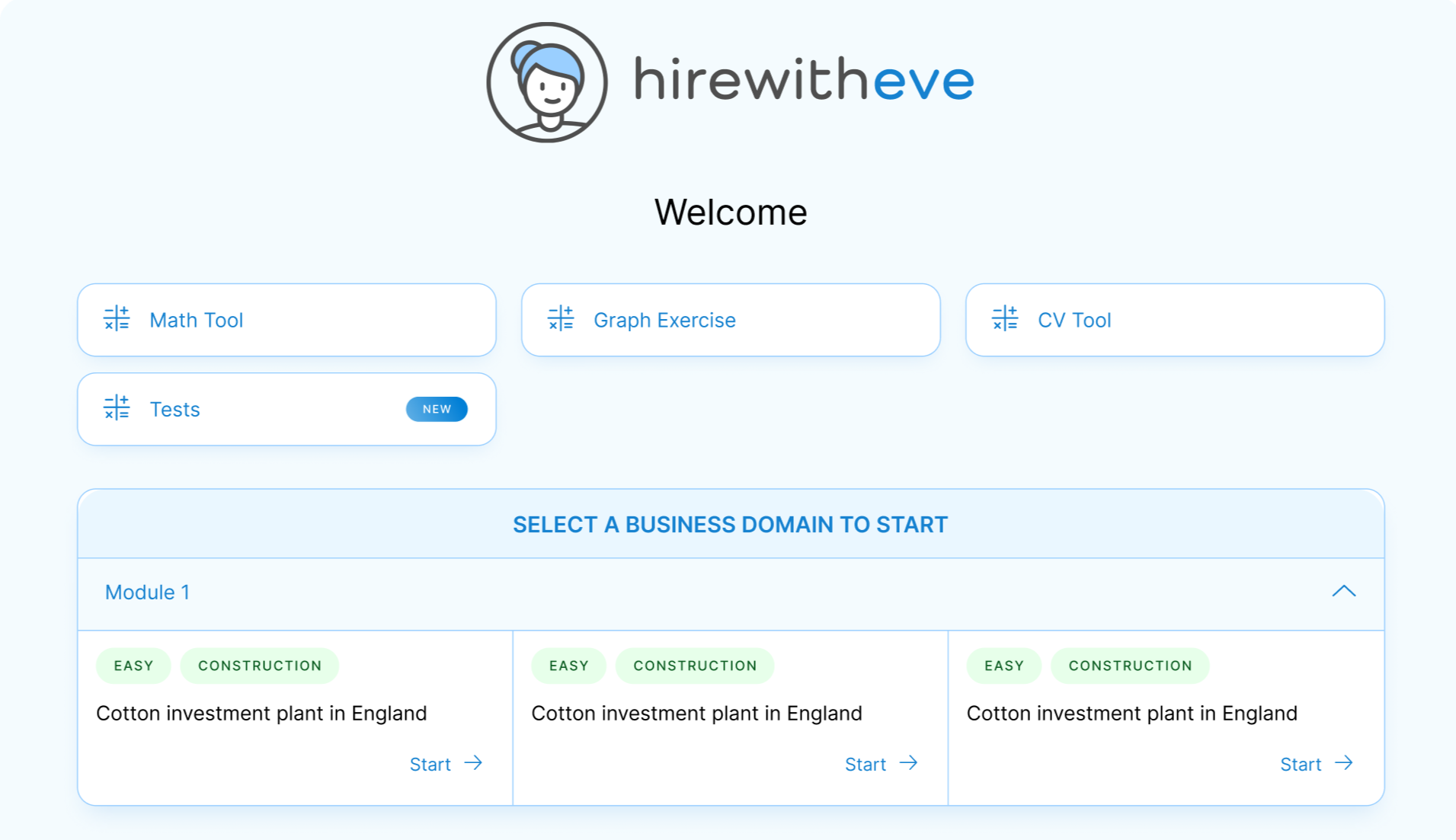Enhancing Job Satisfaction: Factors and Solutions

Job satisfaction is the cornerstone of employee retention, engagement, and performance. When employees are satisfied, they are more productive, motivated, and committed to their organization’s success. For HR managers and talent acquisition specialists, understanding and fostering job satisfaction is crucial for building a stable and high-performing team.
This comprehensive guide will delve into the critical aspects of job satisfaction, debunk common myths, and highlight the top factors that contribute to a satisfied workforce. Furthermore, we will demonstrate how HirewithEve, a leading talent assessment tool, can help you create a more engaged and productive workplace.
Table of contents
Understanding Job Satisfaction
The Myth of Money and Job Satisfaction
The Top 10 Factors Influencing Job Satisfaction
How HirewithEve Ensures Work Satisfaction
FAQs
Conclusion
Understanding Job Satisfaction
Job satisfaction refers to the level of contentment employees feel regarding their work. It encompasses various elements, including the nature of the work, the working environment, relationships with colleagues and supervisors, opportunities for personal growth, and recognition of achievements.
Why is Job Satisfaction Important?
Job satisfaction directly impacts employee motivation, productivity, and overall well-being. Higher job satisfaction levels are associated with reduced turnover rates, leading to a stable team that drives organizational success and profitability.
The Myth of Money and Job Satisfaction
A common misconception among employers is that job satisfaction is primarily about financial compensation. While salary and benefits are important, they are not the sole determinants of job satisfaction. Research from multiple countries, including the US, France, Germany, Canada, and the UK, consistently shows that compensation and benefits rank lower among the sources of job satisfaction.
Nearly 60% of Americans, for example, would prefer a job they love that pays half their current income over a job they hate that pays double. This highlights the importance of other factors in job satisfaction beyond just financial rewards.
The Top 10 Factors Influencing Job Satisfaction
Company Culture
Company culture is a significant determinant of job satisfaction. It encompasses the work environment, employee behavior, values, and attitudes that impact workers' satisfaction, productivity, and retention.
Key Elements of Company Culture:
Shared Values: Common principles and beliefs that guide the behavior of employees.
Shared Goals: Common objectives that unify the workforce.
Attitudes: The overall approach and mindset prevalent within the organization.
Practices: Standard procedures and routines that shape daily work life.
A strong company culture attracts the right people and helps in reducing voluntary turnover. Hiring for culture add, rather than culture fit, enhances diversity and innovation within the organization.
Career Opportunities
Employees highly value opportunities for career growth and development. Providing learning and development opportunities shows that your business supports workers and wants them to achieve their career goals. This not only attracts skilled workers but also retains top talent by showing a clear path to advancement.
Senior Leadership
Leadership plays a crucial role in job satisfaction. Employees are more satisfied when they have a close, supportive relationship with their leaders. Effective leaders lead by example, promote cooperation, treat employees with respect, recognize strengths and weaknesses, and offer support.
Regular one-on-one meetings and talent assessments, such as HirewithEve's Leadership and People Management test, can help ensure your senior leaders have the necessary skills to lead their teams effectively.
Work-Life Balance
Work-life balance is essential for employee satisfaction, particularly for younger workers, working parents, and those with multiple roles. Implementing flexible working policies, such as remote work, hybrid offices, or flexible hours, helps employees balance their work and personal lives, increasing engagement and productivity.
Business Outlook
The business outlook, including growth, sustainability, community involvement, and product or service development, impacts job satisfaction. A positive business outlook provides job security and boosts employee morale and motivation.
Experience
Experience negatively correlates with job satisfaction, meaning that more experienced employees tend to be less satisfied. This can be due to various factors, such as familiarity with the work environment, career stagnation, or financial comfort. Engaging experienced workers in meaningful projects or offering them coaching and mentoring roles can improve their job satisfaction.
Fair Compensation
While not the top factor, fair compensation is still important for job satisfaction. Unfair compensation is a leading cause of employee burnout. Conduct regular market research to ensure competitive salaries and benefits, and be transparent about compensation decisions to enhance perceptions of fairness and equality.
Environment and Relationships
A positive work environment and strong relationships with colleagues create a crucial support network during challenging times. This sense of community enhances job satisfaction by making daily tasks more enjoyable and meaningful. Promoting open communication, diversity, and team-building activities can cultivate a positive work environment.
Recognition and Appreciation
Recognition and appreciation affirm employee's value and contributions to the organization. Regular, constructive feedback and tailored recognition efforts can significantly boost employee morale and productivity.
Reasonable Workload
An unreasonable workload can lead to stress and burnout, negatively impacting job satisfaction. Ensure a manageable workload by setting realistic deadlines, providing the necessary tools and support, and encouraging regular breaks and flexible working arrangements.
How HirewithEve Ensures Work Satisfaction
HirewithEve is a powerful tool for enhancing job satisfaction through effective talent assessment. By using HirewithEve, HR professionals and recruiters can ensure they are hiring candidates who align with the company’s culture, have growth potential, and possess the necessary skills for their roles.
Key Features of HirewithEve:
Culture Add Test: Assess how candidates align with and can enhance your company culture.
Leadership and People Management Test: Evaluate the leadership skills of senior leaders to ensure effective team management.
DISC Personality Test: Understand team dynamics and develop better collaboration and communication strategies.
HirewithEve's comprehensive talent assessments help build a strong, engaged, and productive workforce. By selecting the right candidates and ensuring their satisfaction, you can reduce turnover and drive organizational success.
FAQs
What are the 7 dimensions of job satisfaction?
The seven dimensions of job satisfaction include the nature of the work, pay, development opportunities, supervision, coworkers, work conditions, and company policies. Each dimension shapes an employee’s experience and perception of their job, influencing their engagement, productivity, and loyalty.
What are the 5 keys to job satisfaction?
Engaging Work: Meaningful tasks that resonate with personal values and goals.
Supportive Environment: A culture of inclusivity and teamwork supports positive relationships.
Career Growth: Opportunities for advancement and skill development contribute to professional satisfaction.
Recognition: Frequent acknowledgment of achievements boosts morale and motivation.
Work-Life Balance: Enough time for personal life ensures employee well-being and job satisfaction.
What is the biggest factor impacting employee satisfaction?
The biggest factors impacting employee satisfaction include meaningful and engaging work, a positive work environment, recognition and appreciation, opportunities for professional growth, and a good work-life balance. Fair compensation and benefits that reflect the job’s demands and industry standards are also important.
What are the factors that negatively impact job satisfaction?
Factors negatively impacting job satisfaction include excessive workload, lack of recognition, poor senior management involvement, limited career growth opportunities, inadequate compensation, and a negative work environment. These issues can lead to employee burnout, disengagement, and higher turnover rates.
How do you scale job satisfaction?
Job satisfaction can be scaled by using surveys and questionnaires with specific questions. Employees rate their level of agreement with statements related to job satisfaction factors such as work environment, compensation, recognition, work-life balance, and career development opportunities. The results can be analyzed to identify areas for improvement and develop strategies to enhance job satisfaction.
By focusing on these critical aspects and utilizing tools like HirewithEve, HR managers and talent acquisition specialists can significantly improve job satisfaction, leading to a more engaged and productive workforce.
Conclusion
Job satisfaction is a multifaceted concept that goes beyond financial compensation. By understanding and addressing the various factors that contribute to job satisfaction, HR managers and talent acquisition specialists can create a more engaged and productive workforce. HirewithEve provides the tools necessary to achieve this, ensuring that you hire the right candidates and foster a positive work environment.
The best advice in pre- employment testing, in your inbox.
No spam. Unsubscribe at any time.
Target Your Talent
Unlock tailored solutions for your recruitment and hiring needs with Eve Platform's extensive case study library.
Free Resources

Transforming Hiring: 7 Key Recruiting Metrics
Enhancing recruitment processes with data-driven insights for better hiring outcomes.

Reducing Hiring Bias with Hirewitheve.
Utilizing Hirewitheve to combat bias and streamline recruitment processes effectively.

Hiring Detail-Oriented Candidates
HirewithEve enhances hiring by accurately assessing candidate's attention to detail-oriented.








